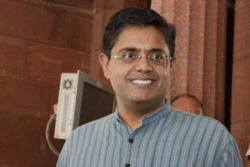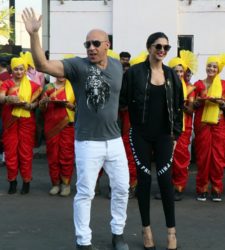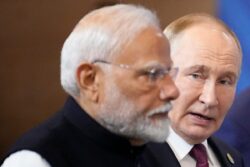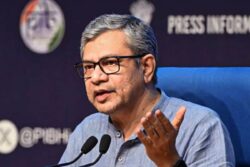Did not direct Aamir to cry: Satyamev Jayate director
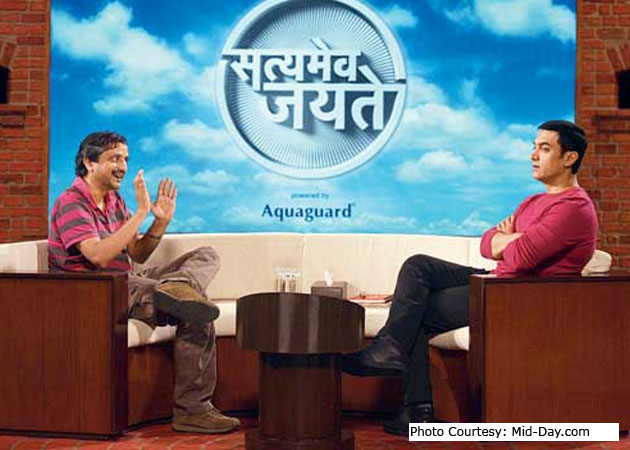
Satyajit Bhatkal, the director of Satyamev Jayate, says he “owned Aamir Khan for a year and a half”. That, of course, makes him the envy of many Bollywood filmmakers. Even though Aamir Khan is currently shooting for Dhoom 3 in Chicago, Bhatkal was assiduously giving finishing touches to the final edit of the special episode of Satyamev Jayate which was aired on Independence Day last week.
Titled Satyamev Jayate Ka Safar , the special episode chronicled the impact of the 13 episodes on the viewer and the country.
You have heard Aamir Khan say all he had to say about the show. Now, the director gets you the story of the man – who stayed behind the scene for two-and-a-half years to put together the impactful show.
Satyajit Bhatkal was not exaggerating when he said that he was so consumed by work on Satyamev Jayate that the self-confessed film buff did not have time to watch a single film in the last two years.
We get the truth behind Satyajit Bhatkal and Satyamev Jayate. Excerpts from a long chat:
Ques: Did you expect Satyamev Jayate to affect people the way it did?
Satyajit Bhatkal: We expected a large impact initially but not on the scale it did. Anything that Aamir Khan does is going to attract attention but I was surprised by the quantity, quality and the continuity of the impact, which overwhelmingly stayed till the end of the show. The show has been taken extremely seriously by politicians of all parties, administrators, people in the IAS, IPS and the judiciary. That was fantastic and it shows that India is changing and is hungry to change. We tried, as honestly as we could, to hold a mirror to ourselves.
Ques: Agreed people were hungry for change. Would you say in a way Aamir served the purpose of a leader initiating that change?
Satyajit Bhatkal: Every place in the world needs leaders. That is the nature of human condition. Aamir has proved to be one in that sense. But I am sure he is one among many others who are in various ways doing wonderful work at the grassroots level. When Aamir takes the lead, he is giving a voice to a lot of these people who are otherwise not heard and making others aware of their work.
Ques: The show faced a huge amount of criticism from various quarters. Were you taken aback?
Satyajit Bhatkal: Not at all. I would have been worried had there not been any criticism. When you are doing a show on public issues, people are bound to have different opinions. We have no issues. At the end of the day you have to look at the intention of the party. For the most part over a period of time, the critics realised our intention was to bring people together and create conversation about our problems. When we did our episode on Intolerance to love, the Khap Panchayat in Haryana announced a boycott of Satyamev Jayate>. Two episodes later, they held a press conference saying they loved the episode on toxic food and that they would conduct workshops to promote organic farming. They did that because they realised we had no personal agenda against anyone.
Ques: In a film, the director is the captain of the ship. Given that it is a real show, what is the relevance of a director in a show like this?
Satyajit Bhatkal: Neither are there actors to direct, nor any great camera work to do because the cameras are fixed. It’s a 10-camera set up and all the cameras are rolling. I used to be in the monitor room. There’s no place on the set. If you look at the set, the cameras are all hidden. We hid them because we wanted to make it a very comfortable atmosphere where a conversation is happening. The main work of a director in a show like this is to provide leadership to the entire thinking process because the show definitely needs to have a good idea. It is not an accident that 10 people turn up on your set out of a subcontinent of 1.2 billion people. There is a whole lot of work in the beginning, which starts with desk and field research, the analysis, finding the right people to speak to about those issues, short-listing and deciding which of them are going to be part of the conversation. Then on the studio floor we roll for nearly six to eight hours. The director is creating and enabling an environment for these conversations to happen. And ultimately to edit, which was a mammoth task too.
Ques: At no point did you ‘direct’ Aamir Khan?
Satyajit Bhatkal: There is no direction in the sense that I can’t go and say, ‘Yaar Aamir, ab tu yeh reaction de, mereko ro ke de.’ It’s a live conversation, happening in real time.
Ques: Did you record more footage purposely to edit later?
Satyajit Bhatkal: That’s not the way you do it. It’s exactly the way the two of us are talking right now. We are having a conversation. If you were to put every word of it into print, it would fill the entire edition. Now, you are making up your mind that if this conversation amounts to a total of 20,000 words, ultimately it is going to be an article of 900 words. It’s your prerogative to decide those 900 words. As long as you do not twist the substantial meaning of what we are saying, there is nothing wrong with it.
Ques: But there were people who accused Aamir Khan of acting…
Satyajit Bhatkal: Those who are saying Aamir is acting are basically saying, ‘Itna kyun rota hai?’ If you have ever interacted with Aamir, you’ll know that he cries on a regular basis for the smallest of things. Seriously, he’s the kind of person who can start crying in an ad. See, he is a sensitive person. People have told him the most heart-rending stories of loss, how 20 years of life have been spent in terror because a woman’s husband beats her or a woman tells him that in eight years she’s had six abortions. These are touching stories to listen to and any sensitive person will be moved.
Ques: How much discussion did Aamir Khan and you have before you started?
Satyajit Bhatkal: Enormous! I owned Aamir for at least a year and a half. Nobody had access to him other than me. I could get him whenever I wanted. We spent many months going through the footage and the research. Aamir knows each of these issues personally. He knows the facts and the figures. His study of them will match that of a good journalist or a sociologist.
Ques: It must have been a Herculean task to convince people to come on the show and confess to their personal turmoil.
Satyajit Bhatkal: It was enormously difficult – to find the right person and then for that person to have trust in you. The credit for it goes to Svati (Bhatkal, co-director and head of the research team) because in most cases, it was her relationship with them that made people feel confident enough to share their experiences. It’s really generous of people, the way they have shared their stories. This is why I say this show really belongs to the people. As a person who has edited this show, I can tell you that out of the total running time on this show, Aamir is talking for less than 25 per cent of the time. Seventy five per cent is the videos or the guests talking.
Ques: The show has changed many lives. Has it changed yours?
Satyajit Bhatkal: It cannot be that you go through such an intense experience and remain unchanged. Then there’s something wrong with you. It’s changed the life of each and every person who has worked on the show in a very fundamental and decisive way.


